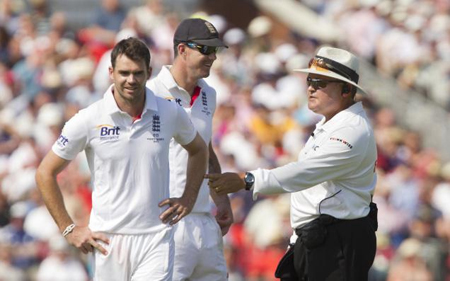
Brisbane, Aug 2: In cricket lingo, it’s called the ‘howler’ a shocking umpiring decision that cannot be explained and usually provokes waves of criticism from one side.
It takes a really bad howler to unite critics from England and Australia, particularly when it involves Ashes contests that have featured plenty of controversy across about 130 years.
Usman Khawaja, if you note the reaction in Australia, seems to have been the victim of one of the worst howlers in history. The overwhelming majority of people from the Prime Minister down were scathing of the decision which meant Australia’s No. 3 batsman was dismissed, caught behind, for one in the third test at Manchester overnight.
One of cricket’s oldest laws that the umpire’s decision is final has been eroded in the last decade or so by technology which allows limited numbers of decisions to be referred to a third umpire who has access to video replays and other technology. And that’s what is causing the issue.
Cricket Australia is asking the International Cricket Council to explain why third umpire Kumar Dharmasena upheld an on-field call at Old Trafford, despite replay technology indicating that Khawaja’s bat made no contact with the ball the ‘edge’ being the essential ingredient for a caught-behind decision.
Australian Prime Minister Kevin Rudd tweeted almost immediately- “That was one of the worst cricket umpiring decisions I have ever seen.”
On Friday, Rudd replied to a direct tweet suggesting that Australia recall its “ambassador” from London and declare a republic instead of its current constitutional monarchy with Britain.
“That may be a little extreme. The recall that is. But what a bad decision!” Mr. Rudd replied.
Australian spin bowling great Shane Warne, working as a TV commentator at Old Trafford, said he was shocked that Dharmasena upheld on-field umpire Tony Hill’s initial decision to give Khawaja out.
“I can’t believe that,” Warne said, several times. “It’s just a staggering decision. The technology has shown clearly that there was enough evidence to overturn a mistake. There was no hot spot, there was no noise, so you just expect that (to be) given not out.
“That’s a shocker, that’s an absolute shocking decision.”
In Australia, where almost 1 million TVs were tuned in to the broadcasts from Old Trafford, Fox Sports commentators and former players Brendon Julian, Greg Blewett and Damien Fleming were outraged. Blewett said he had to be careful what he said in case he used a profanity on television.
As the hashtag “disgrace” trended on Twitter, former England captain Michael Vaughan added- “Feel for a young player who is trying to make his way in the game...Really poor decision.”
Another former England captain, Alec Stewart, added- “That is a ridiculous decision by both the on & off field umpires. DRS creating yet more controversy. Any wonder players don’t walk!”
The DRS an acronym for Decision Review System enables the third umpire to review on-field decisions at the request of either the on-field umpires or the teams on the field. For caught decisions, it uses a combination of visual replays, thermal imaging and audio technology to determine if there was contact between bat and ball.
Despite all three technologies indicating there was no contact between bat and ball, the third umpire still upheld Hill’s initial on-field decision to give Khawaja out.
The Daily Telegraph in Sydney called the decision a “fiasco,” The Australian newspaper said the DRS has become the “third competitor in the Ashes series” while the Sydney Morning Herald said the Khawaja call was the “howler of all howlers.”
Australian Cricketers’ Association chief executive Paul Marsh called for the officials involved to be fired.
“That is the most disgraceful decision I’ve ever seen. What an absolute joke. Put that down to human error -- no fault of DRS,” Marsh said. “The bit people are missing is that technology gave the umpires all they needed to overturn that. Complete incompetence. Jobs should be lost.”
Marsh’s comments were backed up almost unanimously by other critics who said it was not the technology that failed.
The Indian cricket board was widely criticized for objecting to the universal usage of the DRS, and refusing to use it in test matches it hosts due to the cost and the fact it’s not infallible. Some of the people who initially attacked that stance are starting to turn against the system.
After all, incorrect umpiring decisions are inevitable on the field because of things happen in the blink of an eye. That’s easier to accept than an error from an adjudicator with all the technology available and enough time to use it to come to the correct decision.
Dileep Premachandran, editor of the Indian edition of the long-standing cricket publication Wisden, said- “DRS has never been the problem. The way it’s implemented is. Why are obvious howlers not corrected?”
“Hmmm, even Kevin Rudd has a view on the Khawaja decision,” Premachandran tweeted. “They’re laughing in Mumbai. The DRS protocols are all wrong.”





Comments
Add new comment